“Many women find the time around menopause stressful.
This may be partially due to hormonal changes and
resulting bothersome symptoms such as hot flashes and…”.1
Umbrella
What may the Stress Umbrella include?
Depending on the Source (DotS) this Umbrella may include:
- Psychological Stress
- Stress
Definition
What is stress?
DotS the definition of stress may vary. The (United States) National Institute of Mental Health’s (CDC) definition is:
“Stress is the physical or mental response to an external cause, such as having a lot of homework or having an illness. A stressor may be a one-time or short-term occurrence, or it can happen repeatedly over a long time”.2
The (Australian) Jean Hailes for Women’s Health definition is:
We all need a little stress to motivate us to achieve or get things done. However, too much stress, particularly over a long period of time, can take its toll on your health and sense of wellbeing. Extreme stress can be so overwhelming it causes physical reactions such as nausea, diarrhoea, over eating and under eating. There are many things you can do to manage stress; it is just about finding the right strategy for you”.3
Chronic Stress
What may chronic stress cause?
The North American Menopause Society (NAMS) explain:
“Chronic stress is not good for anyone’s health. It may cause increased blood pressure and heart rate, headaches, gastric reflux, depression/anxiety, and, over the long term, an increased risk for heart disease. Some believe that chronic stress may affect our immune system, making us more susceptible to illness, infections, and even cancer. Stress affects not only our health but also our relationships, work performance, general sense of well-being, and quality of life”.4
Menopause
Is there an association between menopause and stress?
In Stress: Getting Serious About Solutions the NAMS elaborate on:
 “Many women find the time around menopause stressful. This may be partially due to hormonal changes and resulting bothersome symptoms such as hot flashes and disrupted sleep. In addition, family and personal issues such as the demands of teenage children, children leaving home, aging parents, midlife spouses, and career changes often converge on women during these years”.5
“Many women find the time around menopause stressful. This may be partially due to hormonal changes and resulting bothersome symptoms such as hot flashes and disrupted sleep. In addition, family and personal issues such as the demands of teenage children, children leaving home, aging parents, midlife spouses, and career changes often converge on women during these years”.5Self-Help
What can I try to relieve stress?
In Violence Prevention: Coping With Stress – Healthy Ways To Cope With Stress the (United States) Centers for Disease Control and Prevention include:
- Take breaks from watching, reading, or listening to news stories…
- Take care of yourself…
- Take care of your body…
- Make time to unwind…
- Talk to others…
- Connect with your community- or faith-based organizations…
- Avoid drugs and alcohol…
- Recognize when you need more help. If problems continue or you are thinking about suicide, talk to a psychologist, social worker, or professional counselor”.6
Online Resources, Programs and Apps
Are online stress management resources, programs and Apps available?
DotC (Depending on the Country) online stress management resources, programs and apps may be available.
Your health care provider or local community health center may know of your country’s recommended online stress management resources, programs and Apps similar to anxiety Online Resources and Programs, by the (Australian) Jean Hailes for Women’s Health.
Health Care Provider
What if my stress is stressing me?
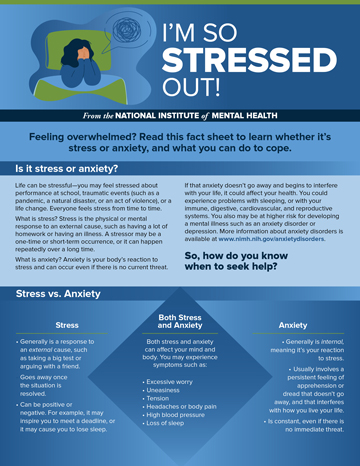 If your stress is stressing you, it may be in your best interest to choose to talk to your health care provider about this.
If your stress is stressing you, it may be in your best interest to choose to talk to your health care provider about this.
In I’m So Stressed Out! Fact Sheet: Recognize When You Need More Help the NIMH elaborate on:
“If you are struggling to cope, or the symptoms of your stress or anxiety won’t go away, it may be time to talk to a professional. Psychotherapy (also called talk therapy) and medication are the two main treatments for anxiety, and many people benefit from a combination of the two”.7
Health Topics A-Z
Where may I find Health Topics A-Z related to Stress?
In Health Topics A-Z you may find:
Links
Where may I find Links related to Stress?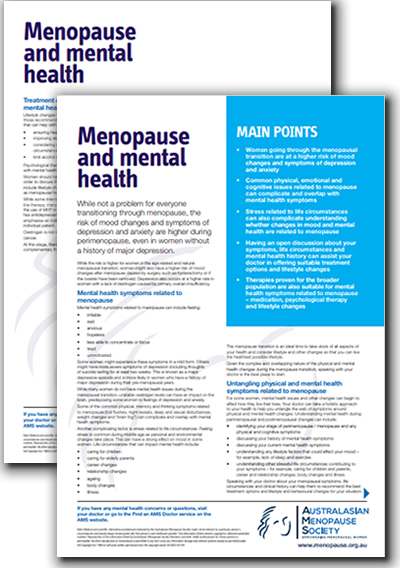
Your Country may have Links similar to:
Links
This Links List to third party websites is neither comprehensive nor exhaustive. Inclusion on this Links List does not imply endorsement or recommendation. Non-inclusion on this Links List does not imply non-endorsement or non-recommendation. Third party websites are not under the control of Meno Martha International Menopause Directory. Third party websites may contain explicit medical images and/or sexual references. Please read Meno Martha International Menopause Directory’s Links Policy before proceeding to a Link. Please contact Webmaster if you experience a problem with a Link.New or Updated
- 10 Stress Busters
- 10 Ways You Can Relieve Stress Right Now
- 4 Benefits of Sleep Meditation and How To Do It
- 5 Steps To Mental Wellbeing
- 5 Ways To Manage Stress During Life’s Hectic Moments
- Acute Stress Disorder: How Can You Help A Loved One?
- Alcohol and Stress
- Anger
- Anxiety
- BMS TV: Headaches, Migraines and the Menopause
- BMS TV: Menopause Explained
- BMS TV: Menopause – Weight Gain, Nutrition and Lifestyle
- BMS TV: Sleep
- Benefits of Talking Therapies
- Breathing Exercises for Stress
- Can Stress Cause Hair Loss?
- Can Massage Relieve Symptoms of Depression, Anxiety and Stress?
- Caregiver Stress: Tips for Taking Care of Yourself
- Chronic Stress Can Cause Heart Trouble
- Chronic Stress Can Wreak Havoc on Your Mind and Body
- Chronic Stress Puts Your Health At Risk
- Cognitive Behaviour Therapy (CBT) for Menopausal Symptoms
- Constantly Down on Yourself? How To Stop Negative Self-Talk
- Consumer Health: Understanding the Link Between Chronic Stress and Depression
- Coping With Stress
- Emotional Wellness In Menopause
- Exercise and Stress: Get Moving To Manage Stress
- Feeling Stressed About Your Role In Life? For Women, That Could Be A Health Risk
- Fight Stress With Healthy Habits Infographic
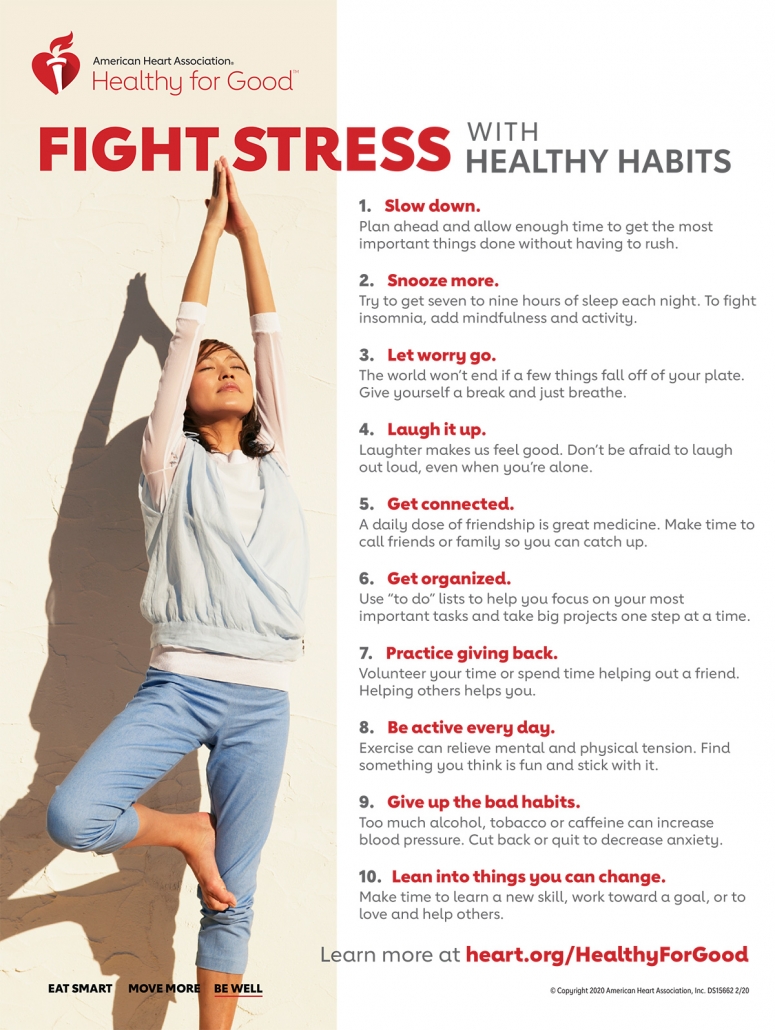
- Getting Active
- Headaches: Reduce Stress To Prevent the Pain
- Home Remedies: Cope With Stress So It Doesn’t Control You
- Hot Flashes: What Can I Do? [+ Video: What Are the Signs and Symptoms of Menopause?]
- How Stress Hurts
- How To Identify Stress
- How To Manage Stress
- How To Manage and Reduce Stress
- ISMA.org.uk [International Stress Management Association]
- I’m So Stressed Out! Fact Sheet: Recognize When You Need More Help
- Later Years (Around 50 Years and Over): Menopause and Post Menopause Health – Menopause and Your Mental Wellbeing [+ Video: Menopause Only Affects You Physically!]
- Mayo Clinic Minute: Signs That Stress Is Becoming Toxic
- Menopause
- Menopause
- Menopause
- Menopause
- Menopause Map: Downloadable Resources – My Personal Path Print Tools: Questions for Your Health Care Provider

- Menopause Map: Downloadable Resources – My Personal Path Print Tools: Symptom Tracker
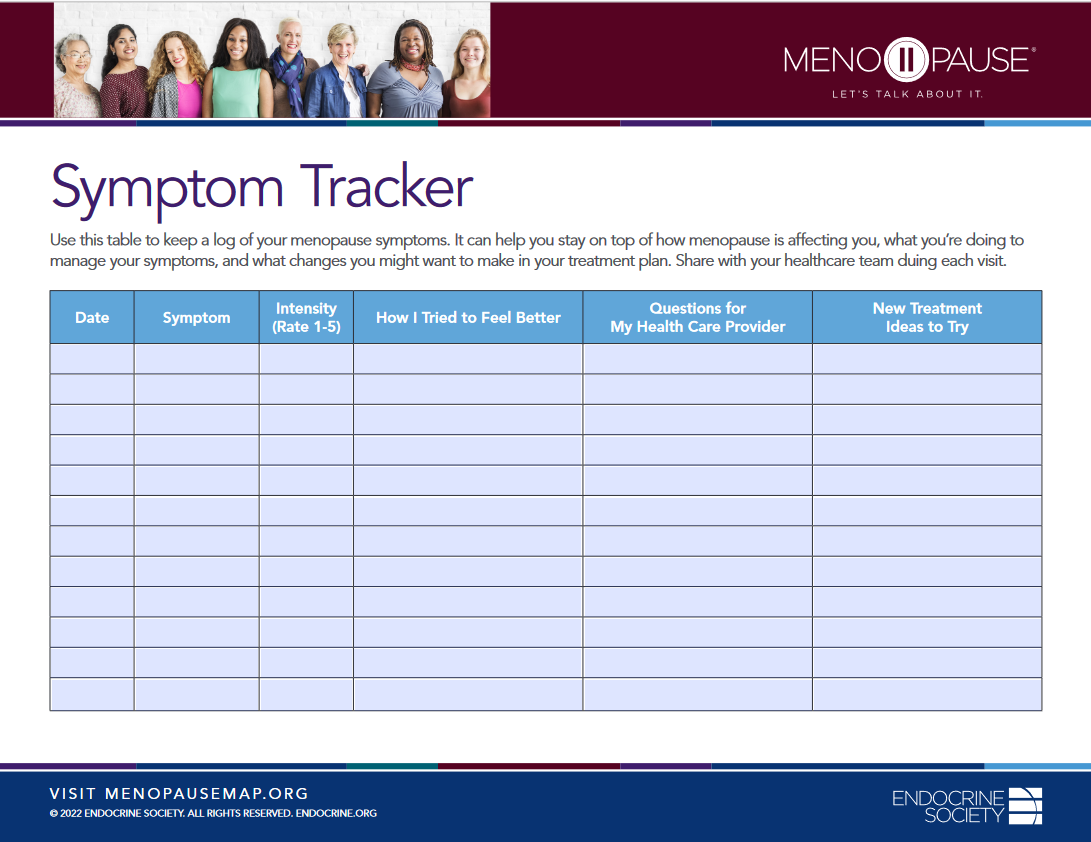
- Menopause Mindfulness: Embracing the Change of My Midlife
- Menopause Patient Information [Videos] 5. Lifestyle Advice In Menopause & Perimenopause
- Menopause Preparedness Toolkit Video Series: Lifestyle Tips for Menopause Wellness
- Menopause Preparedness Toolkit Video Series: Mindfulness & Wellbeing During the Menopause Transition
- Menopause Preparedness Toolkit: A Woman’s Empowerment Guide
- Menopause and Mental Health
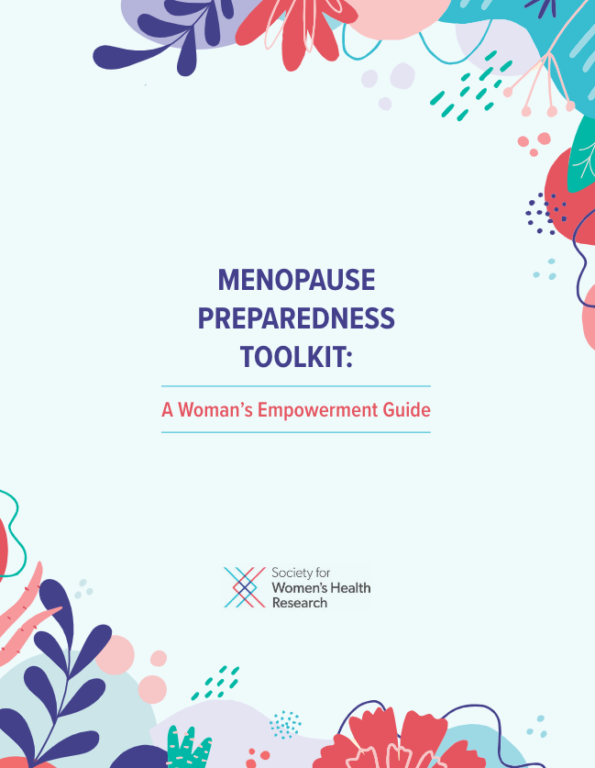
- Menopause: Ensuring A Tranquil Transition
- Menopause: Things You Can Do
- Mental Health & Emotions
- Mentalhealthatwork.org.uk [Mental Health At Work, United Kingdom]: Your First Stop for Better Mental Health At Work
- Mood and the Menopause
- National Center for Complementary and Integrative Health: 5 Things To Know About Relaxation Techniques for Stress
- National Center for Complementary and Integrative Health: Herbs At A Glance
- National Center for Complementary and Integrative Health: How Safe Is This Product or Practice?
- National Center for Complementary and Integrative Health: Meditation and Mindfulness: What You Need To Know
- National Center for Complementary and Integrative Health: Stress
- National Stress Awareness Month [April, United States]
- Navigating Menopause: Expert Insights and Solutions | Dr Susan Davis | The Proof Podcast EP 245
- PTSD: National Center for PTSD [United States Department of Veteran Affairs]
- Post-Traumatic Stress Disorder
- Post-Traumatic Stress Disorder
- Self-Help Tool: Menopause and Mental Wellbeing
- Sleep, Food, Exercise, Stress: Why Working on One of These Can Improve the Others
- Stress
- Stress
- Stress
- Stress Awareness Month 2024 [April, United kingdom]
- Stress Management
- Stress Management
- Stress Management: Basics – Stress Basics
- Stress Management: In-Depth – Exercise and Stress: Get Moving To Manage Stress
- Stress Management: In-Depth – Stress Relief From Laughter? It’s No Joke
- Stress Management: In-Depth – Stress Symptoms: Effects on Your Body and Behavior
- Stress Won’t Go Away? Maybe You Are Suffering From Chronic Stress
- Stress and Heart Health
- Stress and High Blood Pressure: What’s the Connection?
- Supporting A Loved One Through Menopause
- The Stressors of Stress on Your Body and Behavior
- Tips To Help Manage Menopause Symptoms
- Tips To Lower Stress Infographic
- Top Tips To Improve Your Mental Wellbeing
- Types of Talking Therapies: Cognitive Behavioural Therapy (CBT)
- Video Series-2023: Lifestyle Modification and Prevention of Breast Cancer
- What Doctors Wish Patients Knew About Menopause
- What Everyone Should Know About Menopause Symptoms
- What Is Menopause? [+ Video]
- Why Didn’t Anyone Tell Me This? Episode 3: Dr Annice Mukherjee: Your Essential Menopause Toolkit
- Your Body Knows the Difference Between Good Stress and Bad Stress: Do You?
Sources
Where may I find the Sources quoted?
You may find the Sources quoted at:
Sources
- Stress: Getting Serious About Solutions. North American Menopause Society https://www.menopause.org/for-women/menopauseflashes/mental-health-at-menopause/stress-getting-serious-about-solutions Accessed: 16 September 2023
- I’m So Stressed Out! Fact Sheet. National Institute of Mental Health https://www.nimh.nih.gov/health/publications/so-stressed-out-fact-sheet Accessed: 16 September 2023
- Stress. Last Updated: 26 August 2023 | Last Reviewed: 10 March 2014. Jean Hailes for Women’s Health https://jeanhailes.org.au/health-a-z/mental-emotional-health/stress Accessed: 16 September 2023
- Stress: Getting Serious About Solutions. North American Menopause Society https://www.menopause.org/for-women/menopauseflashes/mental-health-at-menopause/stress-getting-serious-about-solutions Accessed: 16 September 2023
- Stress: Getting Serious About Solutions. North American Menopause Society https://www.menopause.org/for-women/menopauseflashes/mental-health-at-menopause/stress-getting-serious-about-solutions Accessed: 16 September 2023
- Violence Prevention: Coping With Stress – Healthy Ways To Cope With Stress. Page Last Reviewed: 30 November 2021. Centers for Disease Control and Prevention https://www.cdc.gov/violenceprevention/about/copingwith-stresstips.html Accessed: 16 September 2023
- I’m So Stressed Out! Fact Sheet: Recognize When You Need More Help. National Institute of Mental Health https://www.nimh.nih.gov/health/publications/so-stressed-out-fact-sheet Accessed: 16 September 2023



